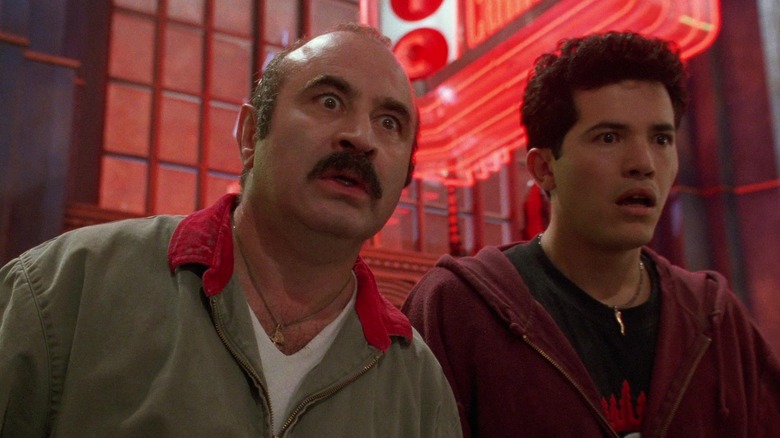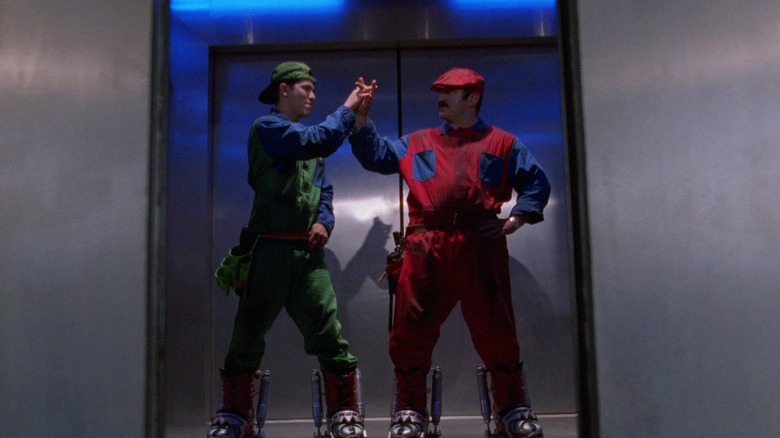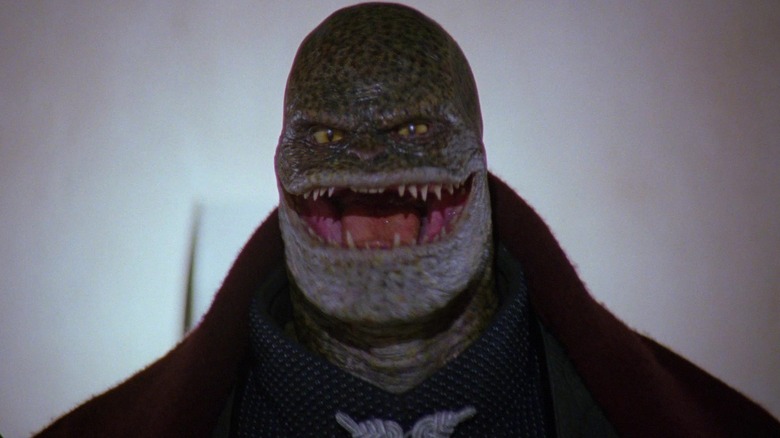The Super Mario Bros. Movie's First Script Was Completely Different
When Annabel Jankel and Rocky Morton's 1993 film "Super Mario Bros." was released in theaters in the spring of 1993, it was almost instantly pilloried by both critics and fans of the Nintendo video games on which it is based. The fans were incensed that the movie bore no resemblance to the games, transforming their whimsical, friendly cartoon kingdom setting into a metallic, filth-ridden, "Blade Runner"-like urban dystopia. The games' villain, an evil fire-breathing Koopa (a variation on the Chinese Dragon Turtle, essentially) named Bowser, was similarly turned into a humanoid dinosaur named King Koopa, played by Dennis Hopper.
The story was also wholly original. "Super Mario Bros." is based on the premise that the meteor that killed the dinosaurs actually created a parallel timeline. In one, the dinosaurs died, primates rose to prominence, and homo sapiens evolved on Earth. In the other, the dinosaurs lived, continued to evolve, and eventually became humanoids just like us. In 1990s Brooklyn, the Mario brothers Mario (Bob Hoskins) and Luigi (John Leguizamo) find a portal between the two dimensions and stumble into Dino World. There, the Mario siblings have to rescue a dinosaur princess (Samantha Mathis) and stop King Koopa from merging his dimension with theirs.
Nintendo's "Super Mario Bros." games were plenty surreal to begin with, so it may have been unwise to make a straight adaptation. Be that as it may, Jankel and Morton's film was too dramatic a departure for many people. That said, "Super Mario Bros." has many passionate defenders who appreciate its originality, striking set designs, and weird ideas.
The relationship between the Mario brothers was fraternal, but it's also established that the elder Mario raised the younger, feistier Luigi after an unnamed tragedy befell their parents. Hoskins and Leguizamo have good chemistry in this regard. According to a 1992 article in the Los Angeles Times, though, an early draft of the film's script — written by Barry Morrow of "Rain Main" fame — described their relationship as being more tender and dramatic ... as in, more like the one between the brothers in "Rain Man."
Also, it was going to be a prequel movie.
Mario and Luigi were meant to have a brotherly relationship like in Rain Man
One must immediately point out that the development of "Super Mario Bros." was troubled from the start. Nintendo licensed the "Super Mario Bros." property to an American film studio, telling its executives they could do whatever they wanted with it. (Nintendo figured its brand was strong enough.) The execs, however, had trouble extrapolating a story from the games' fairy tale premise (a brave hero saves a kidnapped princess from a dragon-like creature). Morrow was the first writer hired to work on the project, and he was quite a "get," as he had just won an Oscar for writing "Rain Man." Because the Mario brothers are plumbers, some insiders even colloquially referred to Morrow's script draft as "Drain Man."
According to the Times article, Morrow's script was also a deliberate knock-off of "Rain Man" ... as well as a prequel to the events of the "Super Mario Bros." games. More specifically, Morrow envisioned the film taking place entirely in the real world, prior to when Mario and Luigi leave Earth to go on Koopa-fighting adventures in the Mushroom Kingdom.
"Rain Man," recall, is a film about Charlie (Tom Cruise), a callow collectibles dealer who is tasked with caring for his autistic brother Raymond (Dustin Hoffman). Charlie and Raymond eventually learn to care for one another, all while taking an extended road trip where they get to know each other. Morrow's script for "Super Mario Bros." placed Mario in the Charlie role and Luigi in the Raymond role, with the pair going on a similar road trip — a video game quest, kind of — that leads to them growing closer. In order to distinguish the project from "Rain Man," these versions of Mario and Luigi were just regular blue-collar guys; neither of them was a slick dealer of collectibles. The movie would then end before anything fantastical happened.
No one knew what to do with Super Mario Bros.
Morrow's version of the Mario Bros. is just as game-accurate as the Jankel/Morton movie, of course, although one can see immediately why it would be unwise. According to the Time article, one of the project's producers had to explain to Morrow that "Super Mario Bros." should be a broadly appealing action-adventure blockbuster in the vein of "E.T. the Extra-Terrestrial," "Batman," "Ghostbusters," or even "Terminator 2: Judgment Day." "Rain Man" was also a blockbuster, mind you, but not the kind studio executives wanted here.
Subsequent attempts to adapt "Super Mario Bros." were not quite right either. It was screenwriters Jim Jennewein and Tom S. Parker (Jannewein wrote 1990s films like "Richie Rich" and "The Flintstones") who felt that "Super Mario Bros." should be constructed like "The Wizard of Oz," with the Bros traveling from our Earth into a parallel world, only to serve as a satire of fairy tales. It was "Shrek" a decade before "Shrek." After some more juggling, though, it wasn't coming together.
Producer Roland Joffé, best known for directing terse dramas like "The Killing Fields" and "The Mission," was a big fan of "Max Headroom," and he eventually approached the show's creators, the husband-and-wife team of Morton and Jankel. They were the ones who came up with the bizarre, dinosaur-dimension idea for the movie, and Joffé loved it. The rest is history. It should also be noted that the Super Nintendo game "Super Mario World" — which featured a rideable dinosaur-like creature named Yoshi — had recently been released, so making a Mario movie about dinosaurs was not 100% out of the realm.
As we all now know, however, "Super Mario Bros." was a huge bomb in terms of both its critical and commercial performance. It would take 30 years for another "Super Mario Bros." movie adaptation to see the light of day.


